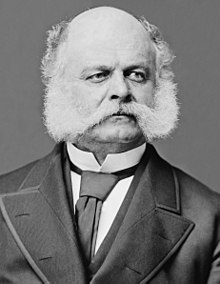Ambrose Burnside | |
|---|---|
 Burnside c. 1880 | |
| United States Senator from Rhode Island | |
| In office March 4, 1875 – September 13, 1881 | |
| Preceded by | William Sprague IV |
| Succeeded by | Nelson W. Aldrich |
| 30th Governor of Rhode Island | |
| In office May 29, 1866 – May 25, 1869 | |
| Lieutenant | William Greene Pardon Stevens |
| Preceded by | James Y. Smith |
| Succeeded by | Seth Padelford |
| Personal details | |
| Born | Ambrose Everts Burnside May 23, 1824 Liberty, Indiana, U.S. |
| Died | September 13, 1881 (aged 57) Bristol, Rhode Island, U.S. |
| Cause of death | Angina |
| Resting place | Swan Point Cemetery Providence, Rhode Island |
| Political party | Democratic (1858–1865) Republican (1866–1881) |
| Spouse |
Mary Richmond Bishop
(m. 1852; died 1876) |
| Education | United States Military Academy |
| Profession | Soldier, inventor, industrialist |
| Signature | |
| Nickname | Burn |
| Military service | |
| Allegiance | United States (Union) |
| Branch/service | United States Army Union Army |
| Years of service | 1847–1865 |
| Rank | |
| Commands | Army of the Potomac Army of the Ohio |
| Battles/wars | |
Ambrose Everts Burnside (May 23, 1824 – September 13, 1881) was an American army officer and politician who became a senior Union general in the Civil War and three-time Governor of Rhode Island, as well as being a successful inventor and industrialist.
He was responsible for some of the earliest victories in the Eastern theater, but was then promoted above his abilities, and is mainly remembered for two disastrous defeats, at Fredericksburg and the Battle of the Crater (Petersburg). Although an inquiry cleared him of blame in the latter case, he never regained credibility as an army commander.
Burnside was a modest and unassuming individual, mindful of his limitations, who had been propelled to high command against his will. He could be described as a genuinely unlucky man, both in battle and in business, where he was robbed of the rights to a successful cavalry firearm that had been his own invention. His spectacular growth of whiskers became known as "sideburns", deriving from the two parts of his surname.